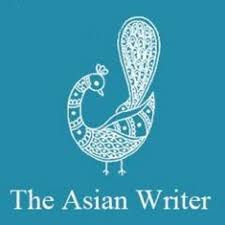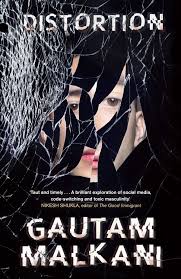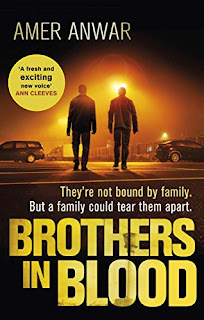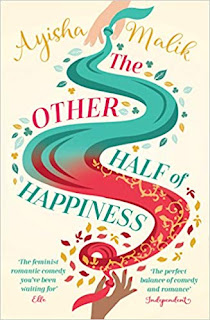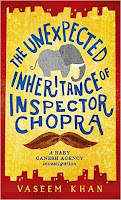On 21st October, the Asian Writer celebrates its 10th birthday with an
all-day festival at the Royal Asiatic Society in London.
The Festival balances showcasing new writing with sessions demystifying the publishing process and workshops on novel writing, poetry and short stories.
Critically acclaimed author of
The Good Children, Roopa Farooki, will be kicking off the day’s proceedings with a keynote speech, drawing on her experience of writing six novels since 2007.
In a panel entitled ‘From draft to publication,’ debut authors, Mahsuda Snaith (
The Things We Thought We Knew) and Radhika Swarup (
Where the River Parts) will join Penguin Write Now Live mentee Emma Smith-Barton to read from their first novels and explore the experiences of first time writers.
In ‘Meet the Gatekeepers’ literary agents Lorella Belli (Lorella Belli Literary Agency) and Juliet Pickering (Blake Friedmann) will be joined by Wasafiri deputy editor, Rukhsana Yasmin to discuss the role of agents and editors.
Best-selling crime writers Vaseem Khan and AA Dhand will be in conversation with thriller writer, Sanjida Kay to explore explore what makes good crime fiction and how writers can sustain readers interest over a series.
The launch of
Dividing Lines, the Asian Writer Short Story Prize anthology, launch will bring new voices to the stage, some of whom are published for the first time.
Finally, a closing panel will look at love and marriage and whether writers exploring such themes consider it an ultimate road to happiness.
Here Catriona Troth interviews organiser Farhana Shaikh and some of the authors who are taking part.
Farhana Shaikh: founder of the Asian Writer and organiser of the festival
Congratulations on your 10th Anniversary! Looking back, what were your goals when you started The Asian Writer? And what are your aims for the next ten years?
Thank you. I wanted to create a platform to showcase new writing as well as raise the profile of published writers. Beyond that, I wasn’t sure back then where an online magazine could lead and I certainly didn’t think I’d be setting up a small press publishing company.
Our aims for the next ten years are to work more closely with writers on developing their work and continue to platform and publish these writers, on our site and through our anthologies. One of the features of the network which excites me most is that a significant proportion of our traffic now comes from South Asia, so I’m looking at ways we can develop partnerships in India and Pakistan to better engage this audience.
How did the idea for The Asian Writer Festival come about?
I think I always knew I wanted to do something to mark our tenth anniversary, which fell in August this year but I wasn’t sure whether that should be a publication of some sort or an event. I’ve been running the Leicester Writes Festival since 2014, and it’s always a lovely space to meet writers and better understand their needs. A festival dedicated to showcasing new and established British Asian voices seemed like a great way to bring people together and celebrate their work and ours.
The programme is an interesting mix of showcasing new writing on the one hand, and providing illumination on the publishing process for inspiring writers on the other. Tell us something about the thinking behind that.
Programming the festival was always going to be a challenge. I tried to find a balance between what would appeal to our readership (who are mainly writers) but also tempt a wider audience to discover exciting new voices.
*****
From: Up-lit to grip-lit: the new faces of crime fiction
Vaseem Khan - author of the Baby Ganesh Detective Agency series
Baby Ganesh is a delight - but where did the inspiration for his eccentric partnership with Inspector Chopra spring from?
You could say this partnership was born on my first day in India, back in 1997 when I went out there to work as a management consultant. I was in a taxi and we stopped at a traffic junction. As I looked out into the passing passing traffic of honking rickshaws, honking trucks, bikes, people, cows, goats, and dogs I saw, lumbering through the chaos, an enormous grey Indian elephant. This surreal sight stuck with me and eventually became a part of the crime novel I wrote when I returned to England ten years later.
You’re a British author writing novels set in modern day Mumbai. Why there, and how would you describe your relationship with the city?
I lived in Mumbai for a decade, and for me it remains the most dazzling city on the subcontinent. The place is a non-stop assault on the senses. I’ve tried to encapsulate this in my books, to give readers an idea of what Mumbai looks like, feels like, sounds like, smells like, and even tastes like. My aim was always to take readers on this journey to the heart of modern India, a place that is undergoing immense change, with globalisation bringing money and sweeping cultural transformation. Yet at the same time it is a place beset by ancient problems such as poverty and caste prejudice. This dynamic between old and new gives me a unique canvas. As someone who loves crime fiction set in exotic locations I wanted to use this to give readers something different.
The Baby Ganesh series comes from the lighter end of the crime fiction spectrum - but you don’t shy away from showing us the poverty and deprivation that lives alongside Mumbai’s prosperity. Did that balance between tone and subject matter come naturally, or did you struggle initially to find the right voice?
I always set out to create a sort of 'gritty cosy crime'. Inspector Chopra is a serious man, and the crimes he tackles are serious crimes, murder, kidnapping, robbery. His elephant sidekick offers light relief, as you suggest, but I always intended for the books to showcase both the light and dark of modern India. This reflects my own experiences there. When I first went to Mumbai, every aspect of the city was exotic and different. However, once I’d spent some time there I began to see that there were aspects of this amazing place that required me to put aside my rose-tinted spectacles and take a closer look. My first trip to the Daravi slum for instance left me open-mouthed. Poverty is endemic, but what is more endemic is the acceptance of poverty, of poor sanitation, of very limited medical facilities, of terrible transport infrastructure, all the things we take for granted in the West. There is a massive gap between rich and poor, and although social change is taking place there are still ancient prejudices ingrained in people’s thinking. Chopra and I both worry about such things - in effect, his voice is my voice!
*****
From: First time writers: From draft to publication
Radhika Swarup, author of Where the River Parts
Hi Radhika. Nice to talk to you again, one year on from the Triskele Lit Fest. It must have been an interesting year for you, with all the attention given to the 70th anniversary of Partition. Has it led to any new discoveries about what happened back then?
Lovely to hear from you, Catriona. This year has been poignant, not just for the milestone it represents, but also for the memories it unearths. While things are getting more political - and more polarised - on both sides of the border I have written about, it is interesting that the same hand-wringing was followed by increased political machismo twenty years ago.
Where the River Parts draws to a close 50 years after Partition, when both India and Pakistan embark on their nuclear programmes. This, the 70th anniversary of both Independence and Partition, is also serving as a forum for families to talk and share their individual histories. While Independence is, and should be the main story, the generation that lived through the Partition is now reaching the end of its life. It is essential these stories are handed down while there is still time.
Your protagonist, Asha, is very young at the start of the novel - feisty for the times, but by modern standards, very much constrained by rules and conventions. How did you find the right voice for her?
We are all subject to the constraints and prejudices of of the times we live in, and Asha was no exception. Her head is kept covered at the start of the novel, and she is expected to marry her parents' - and crucially, her father's - choice, but if you examine the path she leads, she has great agency. She survives a very tough journey into a new country and settles into a hostile household. She chooses not to be defined by her disappointments. She is a true survivor, able to make her way in whichever environment she finds herself in, and though she has her quirks, her impetuousness chief among them, it was a privilege to be able to inhabit her world.
Tell us about your writing routine.
My writing routine is largely defined by two variables. My children and my relationship with my Work in Progress. If I'm in the middle of writing a draft, I find it easiest to wake at 4am to write while the house is quiet. The children rise around 6, and as winter draws in, closer to 7, and we're all in a rush to finish off breakfast, homework, music practice, gather the football cards my eldest loves to trade, and deposit them both safely - and gratefully - to school. Then I write again from 9am to pick up time, and after they're in bed.
Are you now writing a second book, and how does that differ from tackling a first novel?
I'm working now on my second novel, and the main difference to writing my first is that I now know and am comfortable with my habits. I know to adhere to the schedule I've described above, but everything else - the uncertainty while you plot, the frenzy when you actually get down to the writing, and the visceral disdain for your work when you first read it back - remains the same. I think that's what keeps you going as a writer, and that's what keeps you striving to improve.
*****
From: Love and marriage in fiction: a road to happiness?
Radhika Kapur
You’ve written advertising copy and worked as a ghost writer as well as writing your own short stories. How does the writing process differ in these three media?
Well, in my work in advertising I write in a brand's voice. After a few years of doing that, I was bursting to write in my own. That's when I turned to short stories. Also, advertising is about influencing human behaviour, short stories are about human behaviour.
Of course, each medium requires a different skill set and also overlaps with and enriches the other. That's what I love about it. My work as a copywriter has taught me the power of strong, bold ideas and of editing - I usually have just one headline or thirty seconds to make my point. The more you chisel it, the sharper it gets. That's what you need to do in short stories too.
Short fiction lets me explore fleeting nuances of everyday life. It's a photograph of an emotion, a time, a moment.
I read your short story, ‘The Nine-Headed Ravan,’ in the anthology Love Across a Broken Map last year. It’s a beautiful and ironic study of the nature of love. Where did the concept for that story come from?
From bits and pieces of my own life and my own relationships. As a young woman, I would try pinning down love, defining it and boxing it - but love is the annoyingly shaped object that won't fit into any gift box. The nine-headed Ravan actually exists - it was painted by my mother! As the story grew, the role of the painting as a metaphor also grew
I thought it would be interesting to explore a character who is anal about the truth and words. As a writer, I can be like that. I take words very seriously. Which is why my husband is always in trouble!
To echo the question being asked in the panel, what do writers gain and lose in writing about love?
The more honestly we talk about relationships and love, the more we all gain. There are so many manufactured, sugary-icing versions that sit inside our brains.
The only thing I lose is that I expose a very deep, private side of myself, while writing. But, that's ok. How is there to be any meaningful conversation otherwise?
*****
From: Dividing Lines Book Launch
Farrah Yusuf
I was very moved by your story ‘By Hand’ in Love Across a Broken Map. It encapsulated the loneliness of modern urban life. Where did the inspiration for that story come from?
Thank you, that is lovely to hear. I wanted to explore how we all connect - be that through a place, in person or remotely and the assumptions we often make from the little information we have. I decided to use the form of letters rather than email or texts because I rarely get handwritten notes anymore and when I do I always think they say so much more than just the words on the page. I decided to set the story in a flat in a city because I find it interesting that we can all be so close physically but mentally remote.
You’re a playwright as well as a short story writer. How does the writing process differ between the stage and the page?
If I am writing a play I am always thinking about what the action is and what is happening in each sentence, as to even move a character from one side of a stage to another there needs to be a reason. In short stories on the other hand I can indulge in descriptions and move a character in both place and time with a single sentence. I enjoy both as they let me experiment with words in differing ways.
What can you tell us about the new anthology, Dividing Lines?
What strikes me most about it is the spectrum of ideas it explores on the same theme of borders, boundaries and belonging. Each story takes a unique take on the theme and the subtleties within it without straying too far from that central concept. Mine takes a broad interpretation as my story is about a missing father and the way his disappearance impacts on the other characters.
An all-day festival ticket costs £30. Workshops need to be booked separately.
For more information about the festival, for images or quotes or to interview any of the authors featuring at the festival please contact Farhana Shaikh at [email protected] or on 074321 29371
Festival box office: https://www.eventbrite.co.uk/e/the-asian-writer-festival-tickets-37684746090

